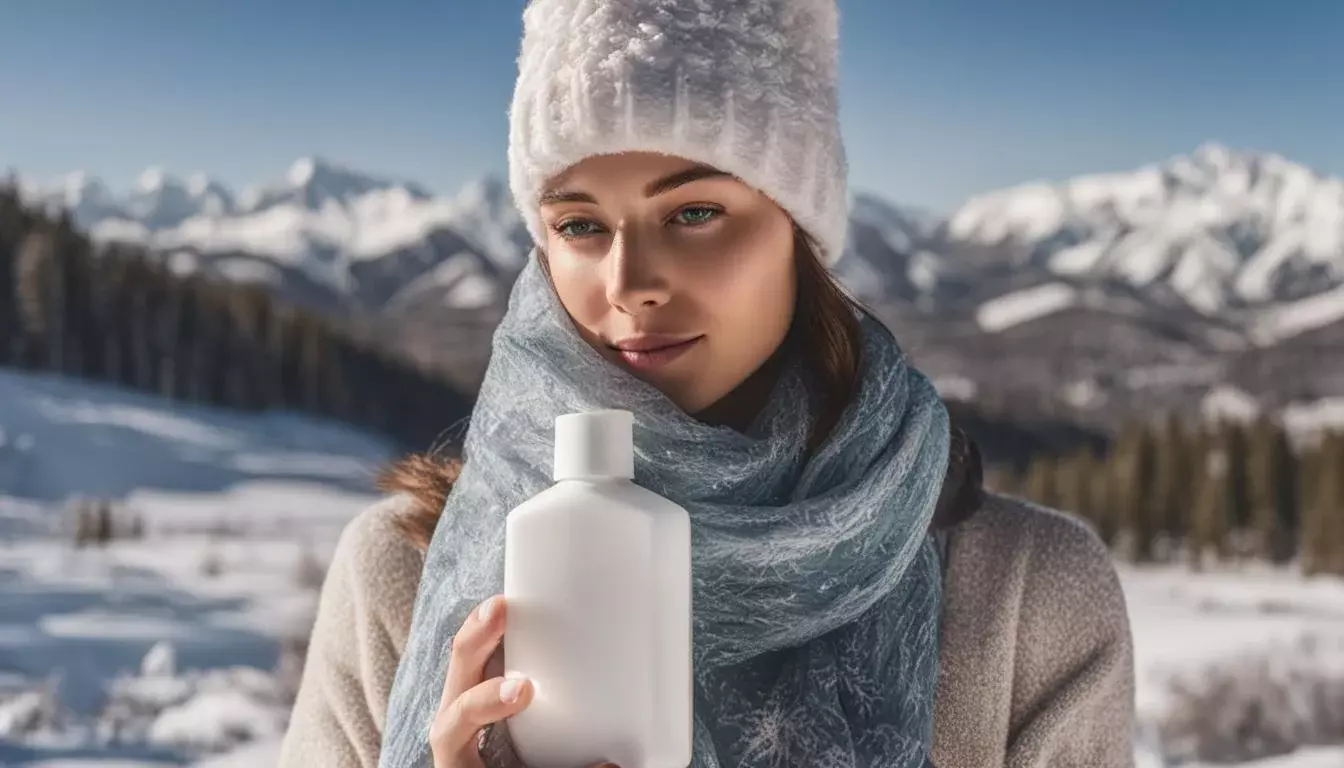During winter, adjusting your skincare routine to protect your skin from the harsh cold weather is essential. The cold temperatures and low humidity can leave your skin dry and irritated and need extra care. Following these simple steps, you can master your winter skincare routine and keep your skin healthy and hydrated throughout the season.
Understanding Your Skin’s Needs in Winter
When the cold weather arrives, adjusting your skincare routine to meet your skin’s specific needs is essential. The dry air and low humidity during winter can lead to dryness, flakiness, and irritation. Understanding how your skin reacts to these changes is crucial in maintaining health and appearance. Following a winter skincare routine and incorporating dry skin remedies can protect and nourish your skin throughout the season.
Gentle cleansers and rich moisturizers are essential in combatting dryness and maintaining a healthy skin barrier. Harsh cleansers can strip away your skin’s natural oils and moisture, leaving it feeling tight and dehydrated. Instead, opt for gentle cleansers that effectively remove impurities without compromising your skin’s hydration levels. Look for cleansers that are specifically formulated for dry and sensitive skin.
Quote: “Understanding how your skin reacts to the changes in weather is crucial in maintaining its health and appearance.”
Hydration is vital for keeping your skin plump and moisturized. During winter, opt for moisturizers that contain humectants, such as hyaluronic acid and glycerin. These ingredients draw moisture from the air into your skin, providing long-lasting hydration. Additionally, emollients, like creams and lotions, form a protective barrier that prevents moisture loss. Look for winter skincare products that contain these hydrating ingredients to keep your skin nourished and protected.
The Effects of Cold Weather on the Skin
Cold temperatures and low humidity can cause your skin to become dry. When the air lacks moisture, it pulls hydration from wherever it can find it, including your skin. This can lead to tightness, flakiness, and even increased sensitivity. Understanding these effects can help you tailor your skincare routine to address these concerns.

| Effects of Cold Weather on the Skin | Solutions |
|---|---|
| Dryness and flakiness | Use gentle cleansers and rich moisturizers to replenish hydration |
| Irritation and increased sensitivity | Opt for skincare products with soothing ingredients like aloe vera or chamomile. |
| Chapped lips | Exfoliate your lips and apply a hydrating lip balm regularly |
| Cracked hands | Moisturize your hands frequently and wear gloves when exposed to the cold |
In conclusion, understanding your skin’s needs during winter is crucial in maintaining health and appearance. You can protect your skin from dryness and irritation by incorporating gentle cleansers, rich moisturizers, and hydrating ingredients into your skincare routine. Don’t forget to take extra care of areas like your lips and hands, which are more prone to dryness during this season. The proper winter skincare routine can keep your skin healthy, hydrated, and protected.
Adjusting Your Cleansing Routine
When it comes to your winter skincare routine, one significant adjustment to make is to your cleansing routine. Traditional foaming cleansers can dry the skin during the colder months, stripping away essential moisture and leaving your skin feeling tight and irritated. To combat this, opting for gentle cleansers that effectively remove impurities without compromising your skin’s hydration levels is best.
Gentle cleansers come in various forms, such as cleansing creams, balms, or oils. These non-foaming alternatives are formulated to cleanse your skin without disrupting its natural moisture balance. Look for winter skincare products specifically designed for dry and sensitive skin, as they often contain nourishing ingredients that help to soothe and protect your skin during the harsh winter weather.
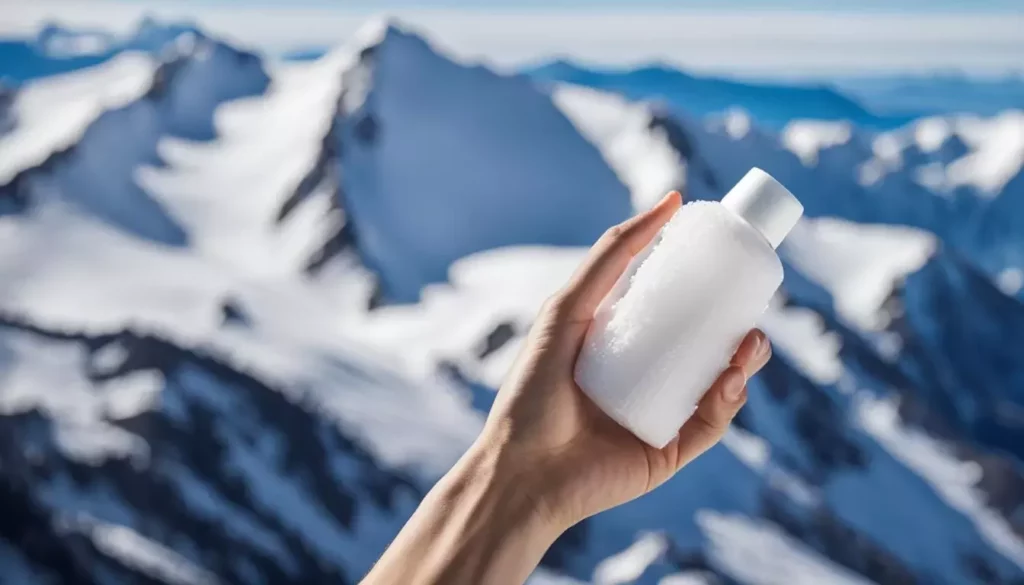
“Switching to a gentle cleanser during winter was a game-changer for my skin. My face feels clean without that tight, dry feeling I used to get with foaming cleansers. I highly recommend trying it!” – Anna, Skincare Enthusiast.
Gentle Cleansers: Winter Skincare Products
| Product | Description | Key Ingredients |
|---|---|---|
| Gentle Cleansing Cream | A creamy cleanser that gently removes impurities without stripping the skin’s natural oils. | Shea butter, jojoba oil, chamomile extract |
| Nourishing Cleansing Balm | A luxurious balm that melts into an oil upon contact with the skin, effectively dissolving makeup and dirt. | Rosehip oil, grapeseed oil, vitamin E |
| Hydrating Cleansing Oil | An oil-based cleanser that effortlessly removes impurities while leaving the skin feeling hydrated and moisturized. | Squalane, argan oil, evening primrose oil |
By adjusting your cleansing routine and opting for gentle cleansers, you can ensure your skin stays clean, nourished, and protected throughout winter.
Treating Acne-Prone Skin in Winter
When it comes to skincare, winter can be challenging for those with acne-prone skin. The cold weather and dry air can exacerbate breakouts and make skin more sensitive. However, with a few adjustments to your skincare routine, you can effectively address acne while keeping your skin hydrated and healthy.
First and foremost, it’s essential to be cautious when using acne-focused skincare products that contain ingredients like salicylic acid and benzoyl peroxide. While these ingredients effectively treat acne, they can further dry out the skin, leading to irritation and flakiness. Instead, consider incorporating pH-optimized skincare products that help regulate the skin’s barrier and maintain its natural moisture balance.
In addition to choosing the right products, using them in moderation is crucial. Overusing acne treatments can strip the skin of natural oils, leading to increased dryness and potentially more breakouts. If you experience excessive dryness or irritation, consider scaling back on the frequency or concentration of acne treatments and focus on incorporating more moisturizing ingredients into your routine.
“By incorporating pH-optimized skincare products and moisturizing ingredients into your routine, you can effectively treat acne while keeping your skin hydrated and healthy during the winter months.”
When moisturizing, look for lightweight, non-comedogenic products that provide hydration without clogging pores. Opt for moisturizers that contain ingredients like hyaluronic acid, ceramides, or niacinamide, which help hydrate and soothe the skin without adding unnecessary oils. It’s also important to remember that moisturizing is crucial in any skincare routine, regardless of skin type.
In summary, treating acne-prone skin in winter requires carefully treating breakouts while maintaining the skin’s hydration. You can achieve more precise, healthier skin during the colder months by using pH-optimized skincare products, moisturizing effectively, and using acne treatments in moderation.

Tips for Treating Acne-Prone Skin in Winter:
- Choose pH-optimized skincare products instead of harsh acne treatments.
- Use acne treatments in moderation to avoid excessive dryness.
- Look for lightweight, non-comedogenic moisturizers with hydrating ingredients.
- Maintain a regular skincare routine to keep your skin balanced and healthy.
Protecting Your Skin in the Shower
Prolonged exposure to hot water can strip your skin of its natural oils and lead to dryness. Protecting your skin while showering is essential, especially during the winter months. Here are some moisturizing tips for winter:
- Opt for lukewarm showers instead of hot ones. Hot water can be harsh on the skin and cause dryness.
- Limit your shower time to 10-15 minutes to prevent excessive skin drying.
- Use a gentle, moisturizing cleanser specifically formulated for dry and sensitive skin. Avoid harsh soaps and cleansers that can further strip away moisture.
- Apply a rich moisturizer immediately after bathing to lock in moisture and prevent dryness. Look for a moisturizer that contains hydrating ingredients such as hyaluronic acid or ceramides.
“Hot water can be harsh on the skin and cause dryness.”
Additionally, consider using a humidifier in your home to add moisture to the air. This can help prevent further dryness and keep your skin hydrated. Remember to drink plenty of water throughout the day to stay hydrated from the inside out.
By taking these steps, you can ensure that your skin stays moisturized and protected even during the colder months.

Exfoliating for Smooth Winter Skin
Incorporating exfoliation into your winter skincare routine is essential for maintaining smooth and healthy skin. Exfoliating helps remove dead skin cells, unclog pores, and promote cell turnover, revealing a fresh and radiant complexion. However, it’s crucial to approach exfoliation cautiously during the dry winter to avoid stripping essential moisture from your skin. Here are some tips to exfoliate effectively and combat dry winter skin.
1. Choose a gentle exfoliator:
Opt for a gentle exfoliating product specifically formulated for winter use. Look for ingredients like jojoba beads, rice enzymes, or fruit enzymes, which provide a gentle yet effective exfoliation without causing irritation or dryness.
2. Limit exfoliation frequency:
It’s best to exfoliate no more than once or twice a week in winter. Over-exfoliating can disrupt the skin’s barrier function and increase dryness and sensitivity. Be mindful of your skin’s response and adjust the frequency accordingly.
3. Follow with a hydrating moisturizer:
After exfoliating, it’s crucial to replenish the skin’s moisture barrier. Follow up with a rich and nourishing moisturizer to lock in hydration. Look for moisturizers that contain ingredients like hyaluronic acid, ceramides, or shea butter, which help restore and retain moisture in the skin.
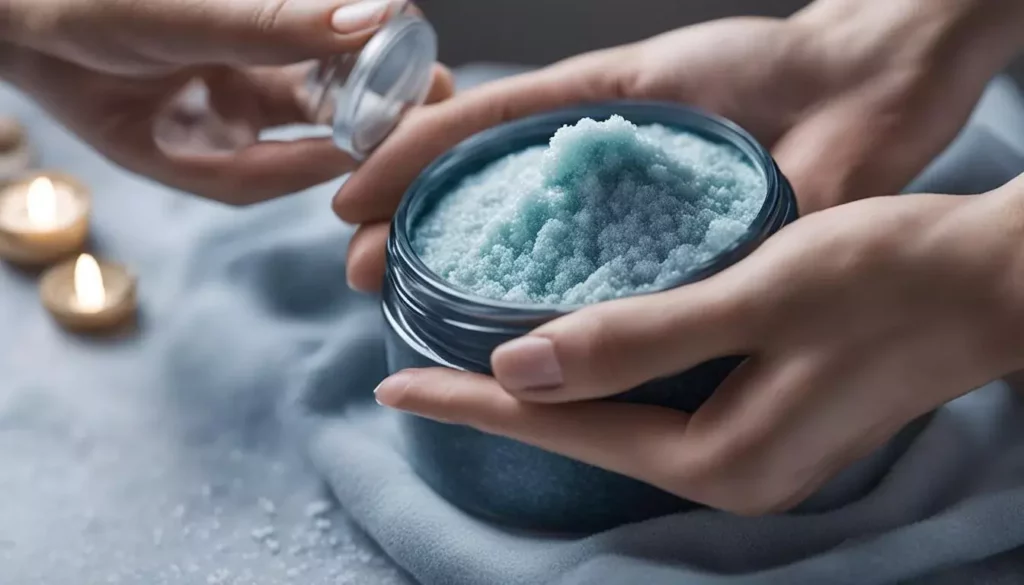
4. Consider chemical exfoliation:
If physical exfoliation is too harsh for your skin during winter, consider incorporating chemical exfoliants like AHAs (alpha hydroxy acids) or BHAs (beta hydroxy acids). These exfoliants gently dissolve dead skin cells and unclog pores, leaving your skin smooth and revitalized. Start with a low concentration and gradually increase if your skin tolerates it well.
Remember, exfoliation is just one step in your winter skincare routine. Follow it up with a hydrating moisturizer and continue to protect your skin from the harsh winter elements. You can maintain a smooth and glowing complexion throughout the winter by incorporating regular exfoliation into your skincare regimen.
Hydrating Your Skin
Incorporating proper hydration into your winter skincare routine is essential for maintaining healthy and moisturized skin. The cold weather can strip your skin of its natural moisture, leading to dryness, irritation, and flakiness. To combat these issues, it’s essential to understand the different moisturizing ingredients that can effectively hydrate your skin.
Humectants
Humectants are ingredients that attract and retain moisture, helping to hydrate and plump the skin. Hyaluronic acid and glycerin are two popular humectants found in winter skincare products. Hyaluronic acid can hold up to 1,000 times its weight in water, making it incredibly hydrating. Glycerin helps to draw moisture from the air and into your skin, providing long-lasting hydration.
Emollients
Emollients are ingredients that help to smooth and soften the skin by filling in the gaps between skin cells. They create a protective barrier on the skin’s surface to prevent moisture loss. Look for winter skincare products that contain emollients like ceramides, shea butter, or natural oils such as jojoba or almond oil. These ingredients help to restore the skin’s natural moisture barrier, keeping it hydrated and supple.
Occlusives
Occlusives are ingredients that form a protective layer on the skin’s surface, sealing in moisture and preventing evaporation. These ingredients work by creating a physical barrier that traps water in the skin. Common occlusives in winter skincare products include argan oil, rosehip oil, or petrolatum-based products like Vaseline. They provide intense hydration and help to improve the skin’s overall moisture retention.
By incorporating humectants, emollients, and occlusives into your skincare routine, you can effectively combat dryness and keep your skin hydrated throughout winter. Look for moisturizers and serums that contain these key ingredients to give your skin the hydration it needs to stay healthy and glowing.
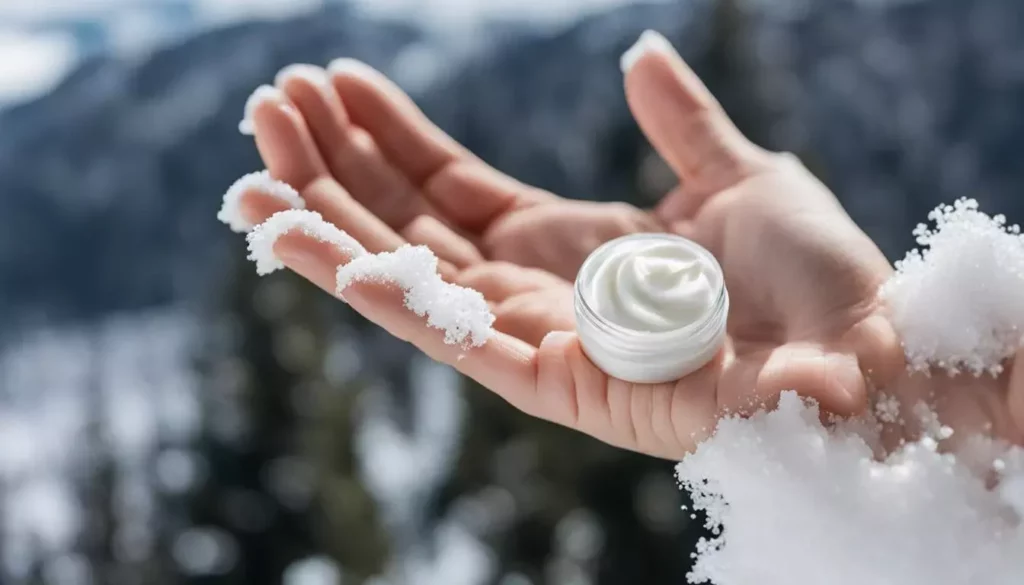
Essential Ingredients for Winter Skincare
Regarding your winter skincare routine, incorporating ingredients is vital to keeping your skin healthy and hydrated. The cold weather can be harsh on your skin, leading to dryness and irritation. By using skincare products that contain ceramides, hyaluronic acid, niacinamide, and botanical oils, you can give your skin the nourishment and protection it needs during the colder months.
Ceramides are lipid molecules that help strengthen the skin’s barrier, preventing moisture loss and protecting against environmental aggressors. Look for moisturizers, serums, and creams that contain ceramides to replenish and repair your skin’s natural barrier function.
Hyaluronic acid is a powerful hydrating ingredient that can hold up to 1000 times its weight in water. It helps attract and retain moisture in the skin, keeping it plump and hydrated. Incorporate hyaluronic acid serums or moisturizers into your routine to boost hydration levels and combat dryness.
Niacinamide is a form of vitamin B3 that has anti-inflammatory and brightening properties. It helps soothe irritation, reduce redness, and improve the overall appearance of your skin. Look for niacinamide in moisturizers, serums, or toners to help calm and nourish your skin during the winter.
Botanical oils such as jojoba oil, almond oil, or rosehip oil can provide additional nourishment and protection to your skin. These oils are rich in antioxidants, vitamins, and fatty acids, which help moisturize and soothe dry, irritated skin. Use facial oils or incorporate them into your moisturizer to give your skin an extra boost of hydration and nourishment.
| Ingredient | Benefits | Skincare Products |
|---|---|---|
| Ceramides | Strengthens skin’s barrier, prevents moisture loss | Moisturizers, serums, creams |
| Hyaluronic Acid | Hydrates and plumps the skin | Serums, moisturizers |
| Niacinamide | Soothes inflammation and brightens skin | Moisturizers, serums, toners |
| Botanical Oils | Moisturizes and nourishes the skin | Facial oils, moisturizers |
By incorporating these essential ingredients into your winter skincare routine, you can keep your skin hydrated, protected, and glowing all season long.
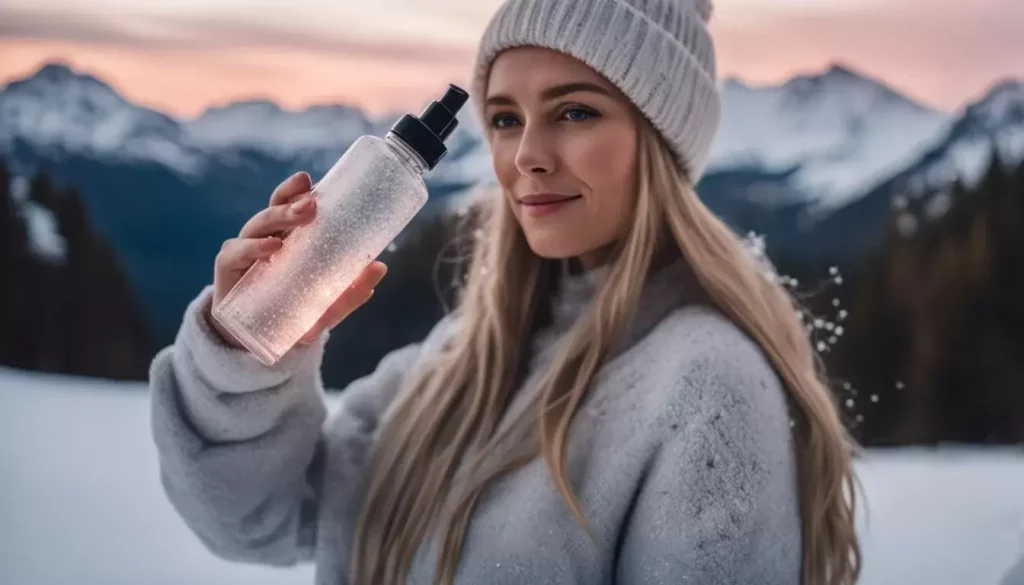
Layering Your Skincare Products
Incorporating a layering technique into your winter skincare routine can help address multiple skin concerns and provide maximum hydration. Following these steps ensures that each product is effectively absorbed and your skin is fully nourished.
1. Start with a Watery Toner
A watery toner is the first step in your layering process. It helps to balance the pH level of your skin and provides a hydrated base for the rest of your skincare products. Apply the toner to a cotton pad and gently pat it onto your face, ensuring even coverage.
2. Follow with a Targeted Serum
After toning, apply a serum that targets your specific skin concerns. Whether brightening, anti-aging, or hydrating, the serum will deliver potent ingredients deep into your skin. Use a pea-sized amount and gently massage it into your face and neck.
3. Lock in Hydration with a Moisturizer
Once the serum has been absorbed, apply a moisturizer to seal in the hydration and provide a protective barrier. Look for a moisturizer rich in emollients and occlusives to prevent moisture loss. Massage a generous amount onto your entire face and neck, paying extra attention to any dry or sensitive areas.
4. Don’t Forget SPF
Finally, finish your skincare routine with a broad-spectrum sunscreen with SPF 30 or higher. Even in the winter months, UV rays can still damage your skin. Apply a nickel-sized amount of sunscreen to your face and neck, gently patting it until fully absorbed.
By layering your skincare products in this order, you can ensure that each product is absorbed correctly and that your skin receives maximum benefits. Remember to give each step enough time to absorb before moving on to the following product. Consistent layering will make your skin well-hydrated, protected, and ready to brave the winter weather.
The Importance of Sun Protection in Winter
Regarding skincare, sun protection should never be overlooked, even in winter. Many people mistakenly believe that the sun’s UV rays are less harmful during this time, but the truth is that they can still cause damage to your skin. UV light can reflect off of snow, increasing the risk of sunburn and long-term skin damage. That’s why it’s crucial to incorporate sun protection into your winter skincare routine.
One of the easiest ways to protect your skin from the sun is using a moisturizer with built-in SPF. Look for a broad-spectrum sunscreen with an SPF of 30 or higher to protect you adequately. Apply it generously to your face, neck, and any other exposed areas of skin about 15 minutes before going outside. Reapply every two hours or more often if you’re sweating or spending extended periods outdoors.
In addition to sunscreen, consider wearing protective clothing, such as wide-brimmed hats and sunglasses, to shield your face and eyes from the sun’s harmful rays. Cover as much skin as possible if you participate in winter sports or activities, and apply a lip balm with SPF to protect your lips.
Remember, the sun’s rays can damage your skin in the winter as in the summer. You can keep your skin healthy and protected year-round by incorporating sun protection into your winter skincare routine.
Overnight Masks for Extra Hydration
As the winter weather can be particularly harsh on the skin, it’s essential to incorporate extra hydration into your skincare routine. Overnight masks are a fantastic way to provide intense nourishment and replenish moisture while you sleep. These masks are formulated with ingredients that deeply penetrate the skin, leaving it hydrated and rejuvenated in the morning.
One popular overnight mask option is the Laneige Water Sleeping Mask. This gel-type mask contains hydro-ionized mineral water, which delivers intense hydration to the skin overnight. It also features a Sleepscent™ fragrance technology that helps relax the mind and body for a better night’s sleep. Apply a generous amount to your face and neck as the final step in your nighttime skincare routine, and wake up to soft, supple skin.
“Overnight masks are a game-changer for my dry winter skin. I love how they provide deep hydration and make my skin look refreshed and plump in the morning.” – Emily, skincare enthusiast
The TONYMOLY Magic Food Banana Sleeping Pack might be the perfect choice if you prefer natural skincare options. This sleeping pack is enriched with nourishing banana extract, which is rich in potassium and antioxidants. It helps soothe and moisturize dry, dehydrated skin, leaving it feeling smooth and revitalized. Apply a thin layer to your face before bed, and wake up with a healthy, radiant complexion.
By incorporating overnight masks into your winter skincare routine, you can provide your skin with the extra hydration needed to combat dryness and keep it healthy and radiant. Whether you prefer gel-type masks or natural options, plenty of overnight masks are available to suit your skincare needs.
Taking Care of Your Lips
During the winter months, chapped lips are one of the most common beauty concerns. The cold weather and dry air can leave your lips feeling dry, cracked, and uncomfortable. Thankfully, there are simple steps you can take to keep your lips hydrated and healthy throughout the winter season.
Exfoliate for Smooth Lips
Like the rest of your skin, your lips can benefit from exfoliation. By gently removing dead skin cells from the surface of your lips, you can reveal smooth, soft lips underneath. You can use a homemade scrub made from a mixture of sugar and honey to exfoliate your lips. Apply the scrub to your lips and gently massage in circular motions. Rinse off with warm water and follow up with a hydrating lip balm.
Hydrate with a Nourishing Lip Balm
When choosing a lip balm for the winter, opt for one that provides deep hydration and protection. Look for lip balms that contain nourishing ingredients like shea butter, coconut oil, or vitamin E. These ingredients help to lock in moisture and provide a protective barrier against the harsh winter elements. Apply your lip balm throughout the day, especially before heading outdoors, to keep your lips moisturized and prevent dryness.
Protect Your Lips from the Elements
In addition to using a hydrating lip balm, it’s essential to protect your lips from the elements. Cold wind and harsh sunlight can further dry your lips and cause discomfort. Consider wearing a scarf or a turtleneck to shield your lips from the cold wind, and always apply lip balm with SPF before spending time outdoors. This extra protection layer will help keep your lips moisturized and prevent sun damage.
Following these simple steps, you can keep your lips soft, smooth, and healthy all winter. Incorporate lip care into your daily skincare routine, exfoliating regularly and applying a nourishing lip balm throughout the day. Proper care and protection allow you to enjoy beautiful, hydrated lips even in the coldest months of the year.

The Importance of Hand Care in Winter
Many people focus solely on their faces when it comes to winter skincare routines. However, it’s essential not to neglect your hands, which are often exposed to the harsh winter weather. Your hands can become dry, cracked, and uncomfortable without proper care. Follow these essential hand care tips to keep your hands looking and feeling their best this winter.
Exfoliating Your Hands
Exfoliating your hands is an essential step in your winter skincare routine. Regular exfoliation helps remove dead skin cells and allows moisturizers to penetrate more effectively. You can use a gentle hand scrub or make your own at home using ingredients like sugar and olive oil. Gently massage the scrub onto your hands, focusing on rough patches and dry areas. Rinse thoroughly and pat dry.
Hydrating Hand Creams
After exfoliation, it’s crucial to replenish the moisture in your hands with a hydrating hand cream. Look for hand creams that contain ingredients like shea butter, glycerin, or hyaluronic acid, as these help lock in moisture and provide long-lasting hydration. Apply the hand cream generously, massaging it into your hands and cuticles until fully absorbed. For added hydration, cover your hands with cotton gloves overnight to allow the cream to penetrate deeply.
| Product | Main Ingredients | Benefits |
|---|---|---|
| Hand Cream A | Shea butter, coconut oil, vitamin E | Deeply moisturizes and repairs dry skin |
| Hand Cream B | Glycerin, hyaluronic acid, chamomile extract | It provides intense hydration, soothes irritation |
| Hand Cream C | Olive oil, argan oil, jojoba oil | Nourishes and rejuvenates the skin |
In addition to using a hydrating hand cream, it’s essential to protect your hands from further dryness. Wear gloves when going outside in cold weather, and avoid prolonged exposure to hot water, as it can strip the skin of its natural oils. By following these tips and incorporating hand care into your winter skincare routine, you can keep your hands soft, smooth, and comfortable all season long.
Embracing Facial Oils for Nourishment
Facial oils can be a game-changer when nourishing and hydrating your skin during the winter months. These luxurious, concentrated blends of botanical oils provide intense moisturization and help lock in hydration, leaving your skin radiant and supple. Facial oils are packed with essential fatty acids and antioxidants that can help strengthen your skin’s barrier and protect it from environmental stressors.

One of the benefits of using facial oils is their versatility. They can be used on all skin types, including oily and acne-prone, as they help regulate sebum production and provide lightweight hydration. Facial oils can also relieve dry, flaky skin, nourishing it with essential nutrients and restoring its natural glow.
When incorporating facial oils into your winter skincare routine, choosing the right oil for your skin type and concerns is essential. For example, jojoba oil suits all skin types and helps balance sebum production. Rosehip oil is rich in vitamins A and C, making it an excellent choice for brightening and anti-aging benefits. Argan oil is deeply hydrating and can improve the appearance of fine lines and wrinkles.
Top Benefits of Facial Oils:
- Intense hydration and moisturization
- Strengthening of the skin’s barrier
- Protection against environmental stressors
- Regulation of sebum production
- Improvement in the appearance of fine lines and wrinkles
- Brightening and anti-aging benefits
To incorporate facial oils into your routine, apply a few drops to clean, damp skin after cleansing and toning. Gently massage the oil into your face and neck using upward motions. Allow the oil to absorb fully before applying any additional skincare products.
Facial oils can make a significant difference in your winter skincare routine. Their nourishing properties and ability to lock in moisture can help combat dryness and keep your skin looking healthy and radiant even in the harshest weather conditions.
Conclusion
As winter approaches, you must prioritize your skincare routine to protect your skin from the harsh cold weather. Following these simple steps, you can master your winter skincare routine and keep your skin healthy and hydrated.
Understanding your skin’s needs in winter is crucial. The cold temperatures and low humidity can lead to dry, irritated skin. Adjust your cleansing routine by opting for gentle cleansers, creams, balms, or oils that wash the skin without stripping away moisture.
Hydration is critical during the winter months. Look for moisturizers that contain humectants like hyaluronic acid and glycerin, which draw moisture from the air into the skin. Additionally, layering your skincare products allows you to address multiple skin concerns and provide maximum hydration.
Don’t forget to protect your skin from the sun’s harmful UV rays, even in winter. UV light reflects off of snow, increasing the risk of sunburn. Use a moisturizer with built-in SPF to ensure your skin is protected year-round.
With the proper winter skincare routine and suitable women’s products, you can keep your skin healthy, hydrated, and glowing all winter.




